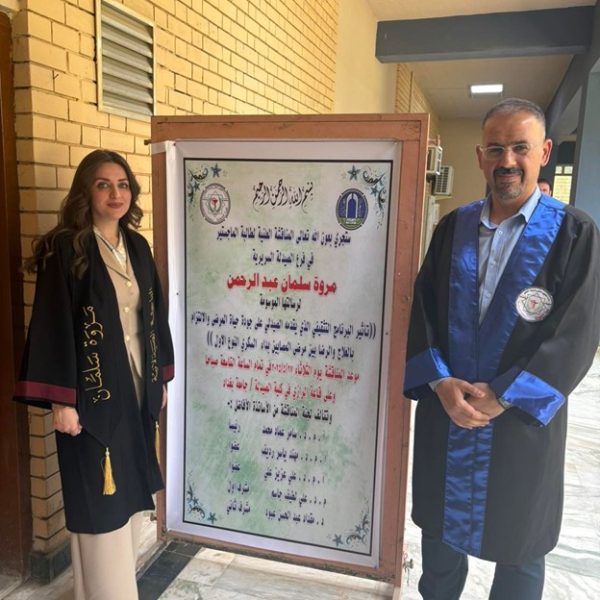The College of Pharmacy discussed the MSc thesis entitled “Impact of Pharmacist Led-Education Program on Glycemic Control, Quality of Life, Medication Adherence and Medication Satisfaction Among Patients with Type 1 Diabetes Mellitus” by the student Marwa Salman Abdulrahman and her supervisors, Lecturer Dr. Ali Lateef Jasim at the Clinical Pharmacy Department and Dr. Muqdad Abdulhasan Abood at Specialized Center for Endocrinology and Diabetes Baghdad/ Alrusafa.
The study aimed to evaluate the effects of pharmacist-led educational interventions on improving glycemic control, quality of life, treatment adherence, and satisfaction in individuals with type 1 diabetes.
The study included a prospective study to compare before and after the educational intervention by the pharmacist at the Specialized Center for Endocrinology and Diabetes in Baghdad/ Al-Rusafa. Eighty seven adult patients who had previously been diagnosed with type 1 diabetes by specialists at the center participated. They were divided into two groups (interventional 44 patients) and (control 43 patients). The first phase included baseline assessments for all participants: glycated hemoglobin level in the blood, patients’ quality of life (measured using the Iraqi Diabetes Quality of Life Scale), treatment adherence (Iraqi Diabetes Medication Adherence Scale), treatment satisfaction (Medication Treatment Satisfaction Questionnaire), and their knowledge regarding insulin self-administration. These measurements were taken through face-to-face interviews for each patient in both groups (control and intervention). Patients in the intervention group participated in a 20-30-minute educational session and were given an educational booklet in Arabic designed by the researcher, also Phone numbers were exchanged with the researcher for follow-up purposes. Second: After three months, the same parameters were re-evaluated in both groups (standard and interventional).
The study demonstrated that pharmacist-led interventions, including educational interventions, can improve blood sugar levels, enhance patients’ quality of life, and increase adherence to insulin therapy. Pharmacists also play a critical role in educating patients about insulin use, its potential side effects, and proper self-injection techniques.
The study recommended developing a comprehensive training program to prepare pharmacists to effectively educate patients with chronic diseases, including diabetes, as it is important to provide healthcare providers with all the resources to ensure consistent support for diabetes patients. Additional multicenter studies provide a robust framework for evaluating interventions, such as pharmacist educational interventions or examples of new metrics and time-in-scope interventions in type 1 diabetes.






